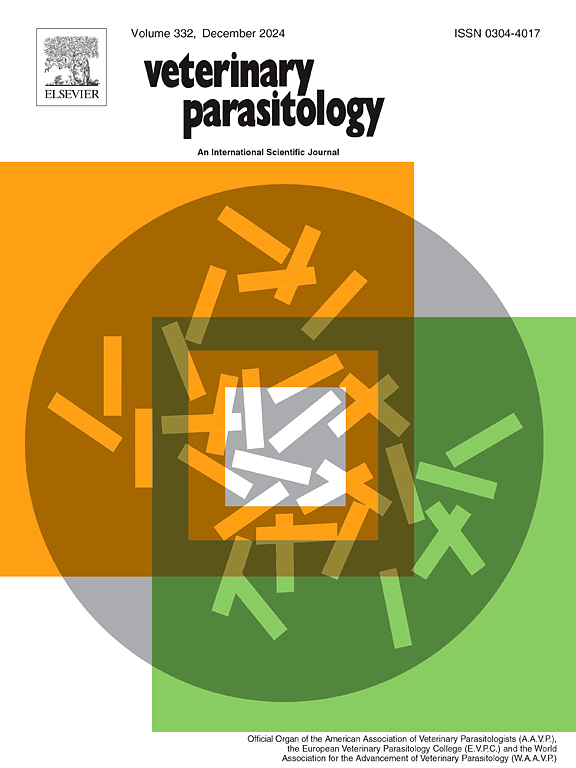干扰素α和β受体赋予小鼠抵抗犬新孢子虫感染的能力
IF 2.2
2区 农林科学
Q2 PARASITOLOGY
引用次数: 0
摘要
犬新孢子虫是一种细胞内原生动物,是新孢子虫病的病原体,是一种与兽医领域相关的疾病,可引起狗的神经肌肉疾病和反刍动物的反复流产。目前,还没有能够诱导无菌治愈感染的治疗方法,预防策略仅依赖于环境管理。在这种情况下,我们的目的是确定干扰素α和β受体(IFNAR)的保护作用在实验感染犬链球菌。我们用基因缺陷小鼠(Ifnar-/-)进行了体内实验。与野生型(WT)对照直接比较,这些小鼠对感染的存活率降低,与不同组织中寄生虫负荷增加和炎症有关。与此一致,我们观察到IFN- i受体的缺失导致控制感染的关键炎症介质,即IL-12、IFN-γ和一氧化氮的显著减少。总之,我们的研究结果表明,IFNAR是一个中心分子,通过诱导有效的Th1免疫反应,通过控制急性和慢性寄生虫复制,介导宿主对犬链球菌的抗性。本文章由计算机程序翻译,如有差异,请以英文原文为准。
Interferon alfa and beta receptor confers resistance against Neospora caninum infection in mice
Neospora caninum is an intracellular protozoan that is the causative agent of neosporosis, a disease relevant to the veterinary field for causing neuromuscular disease in dogs and repeated abortions in ruminants. In the present moment, there are no therapies that are able to induce sterile cure against the infection and prevention strategies rely only in environmental management. In this context, we aimed to determine the protective role of the Interferon alpha and beta receptor (IFNAR) during an experimental infection with N. caninum. We performed in vivo experiments with genetically deficient mice (Ifnar-/-). Those mice, in direct comparison with wildtype (WT) controls, presented reduced survival against the infection, associated with increased parasite load and inflammation in different tissues. In agreement, we observed that the absence of the IFN-I receptor led to a significant reduction in crucial inflammatory mediators that control the infection, namely IL-12, IFN-γ and nitric oxide. Together, our results showed that IFNAR is a central molecule that mediates host resistance against N. caninum by controlling acute and chronic parasite replication, through the induction of an effective Th1 immune response against this protozoan parasite.
求助全文
通过发布文献求助,成功后即可免费获取论文全文。
去求助
来源期刊

Veterinary parasitology
农林科学-寄生虫学
CiteScore
5.30
自引率
7.70%
发文量
126
审稿时长
36 days
期刊介绍:
The journal Veterinary Parasitology has an open access mirror journal,Veterinary Parasitology: X, sharing the same aims and scope, editorial team, submission system and rigorous peer review.
This journal is concerned with those aspects of helminthology, protozoology and entomology which are of interest to animal health investigators, veterinary practitioners and others with a special interest in parasitology. Papers of the highest quality dealing with all aspects of disease prevention, pathology, treatment, epidemiology, and control of parasites in all domesticated animals, fall within the scope of the journal. Papers of geographically limited (local) interest which are not of interest to an international audience will not be accepted. Authors who submit papers based on local data will need to indicate why their paper is relevant to a broader readership.
Parasitological studies on laboratory animals fall within the scope of the journal only if they provide a reasonably close model of a disease of domestic animals. Additionally the journal will consider papers relating to wildlife species where they may act as disease reservoirs to domestic animals, or as a zoonotic reservoir. Case studies considered to be unique or of specific interest to the journal, will also be considered on occasions at the Editors'' discretion. Papers dealing exclusively with the taxonomy of parasites do not fall within the scope of the journal.
 求助内容:
求助内容: 应助结果提醒方式:
应助结果提醒方式:


